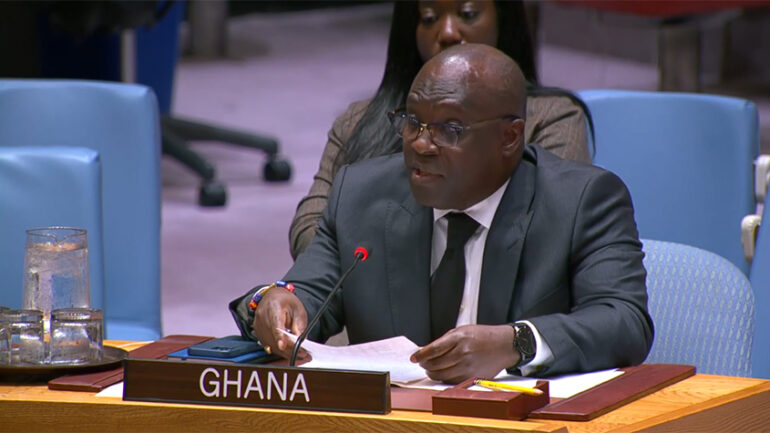Maritime security: prevention, innovation, and international cooperation to address emerging challenges

- Posted by admin
- Posted in News, Statement & Remarks, UNSC
Mr. President, Your Excellency José Raúl Mulino, President of the Republic of Panama,
I will begin by congratulating Panama for its Presidency and commend your delegation for rallying global attention around the subject of maritime security.
Ghana thanks the distinguished briefers for their insightful contribution to today’s debate.
For centuries the world’s oceans and seas have been the enabler of global commerce, human exchanges, societal progress, and economic livelihood. With more than 80 percent of international commerce being transported by sea, the planet’s beating blue heart possesses an unparalleled ability to sustain humanity itself.
However, the sustainable use of the oceans and seas is hindered by violations to the laws of the sea; the incidence of piracy in the oceans and criminality at sea; and illegal, unreported and unregulated fishing, among others.
As reported by the International Maritime Bureau in its 2024 report, 116 piracy incidents occurred last year, in similar ranges as those for 2022 and 2023. This persisting concern as well as the growing incidence of maritime crimes, weaponized drone attacks, cyberattacks and destructive acts against offshore installations and ports pose a serious threat to international peace and security, international trade, and global economic stability.
Maritime security is therefore an important area of concern which must continue to be the focus of attention of this Council. As a coastal State, Ghana is cognizant of the cost of blue crimes to States and its adverse impacts.
For today’s debate, Ghana will make three (3) brief points.
First, the stability required for ocean governance can only be rooted in law – in the Charter of the United Nations and the arrangements of international law, particularly the United Nations Convention on the Law of the Sea (UNCLOS), which lays down a comprehensive regime of law and order for the world’s oceans and seas. The response to incidents in the world’s oceans and seas should therefore be rules-based and must seek to establish, with common clarity, the expectation that exists in relation to the oceans and seas. In this regard, the mobilization of international efforts within bodies such as the International Maritime Organisation and this Council is important for shaping an arrowhead required for asserting the global norms on the oceans and seas and helping to coordinate global actions.
Second, Ghana supports regionalized approaches to responding to the threats to maritime security, consistent with international rights and obligations.
Ghana welcomes the increasing spirit of regional cooperation among littoral States and across regions in addressing challenges within high-risk maritime domains. While significant challenges remain, the move from ad hoc collaboration to more institutionalized and coordinated efforts including the harmonization of legislation across regional states has the potential to create sustainable solutions. Emerging threats such as terrorism and weaponized drone attacks, particularly in the Red Sea, West Indian Ocean, and Gulf of Aden, require the most robust form of regional and international cooperation. In the case of the Gulf of Guinea, we continue to be fully committed to the full operationalisation of the Yaoundé Architecture through the resolution of all operational, technical, and financial issues that hamper its effective functioning.
Third, Ghana believes that concerted regional approaches at the technical and operational level should also be rooted in prevention and must seek to address the root causes of pre-existing and emerging threats at sea. Preventive and long-term approaches must be anchored in measures that address structural challenges such as poverty, youth unemployment and political instability as well as the impact of climate change on livelihoods.
Furthermore, Ghana notes that innovation and modern technologies have proven to be a promising pathway for enhancing national and regional capacity to address maritime threats, port security, and improve port and vessel monitoring, boost information gathering as well as overall maritime domain awareness within and across nations. For countries like Ghana, where maritime trade is the lifeblood of the economy, the responsible use of modern technology, including AI tools to locate, assess and interdict negative actors at sea is a growing necessity.
In concluding, Ghana calls for urgent action to address the absence of a global strategy and the fragmented approaches to ensuring global maritime safety. A standalone item on the Council’s agenda dedicated to maritime security would be a useful starting point. We also urge the Council’s efforts for a united, long-term focus on emerging threats faced within the global maritime space that combine prevention, innovation, and regional collaboration.
Ghana remains committed to supporting all efforts aimed at fully implementing the United Nations Convention on the Law of the Sea, the AU’s Integrated Maritime Strategy 2050 and Security Council Resolution 2634 (2022), on maritime security in the Gulf of Guinea, which Ghana and Norway co-led.
I thank you.
